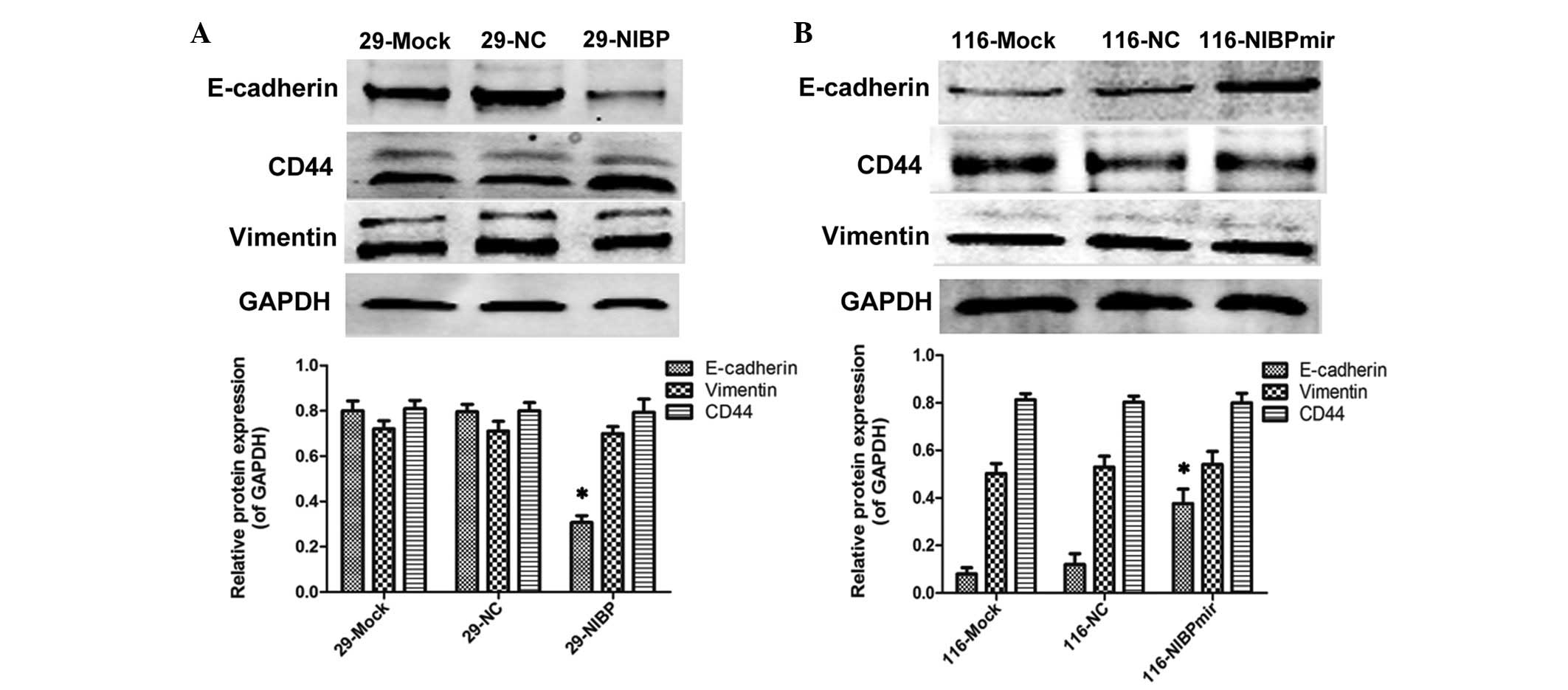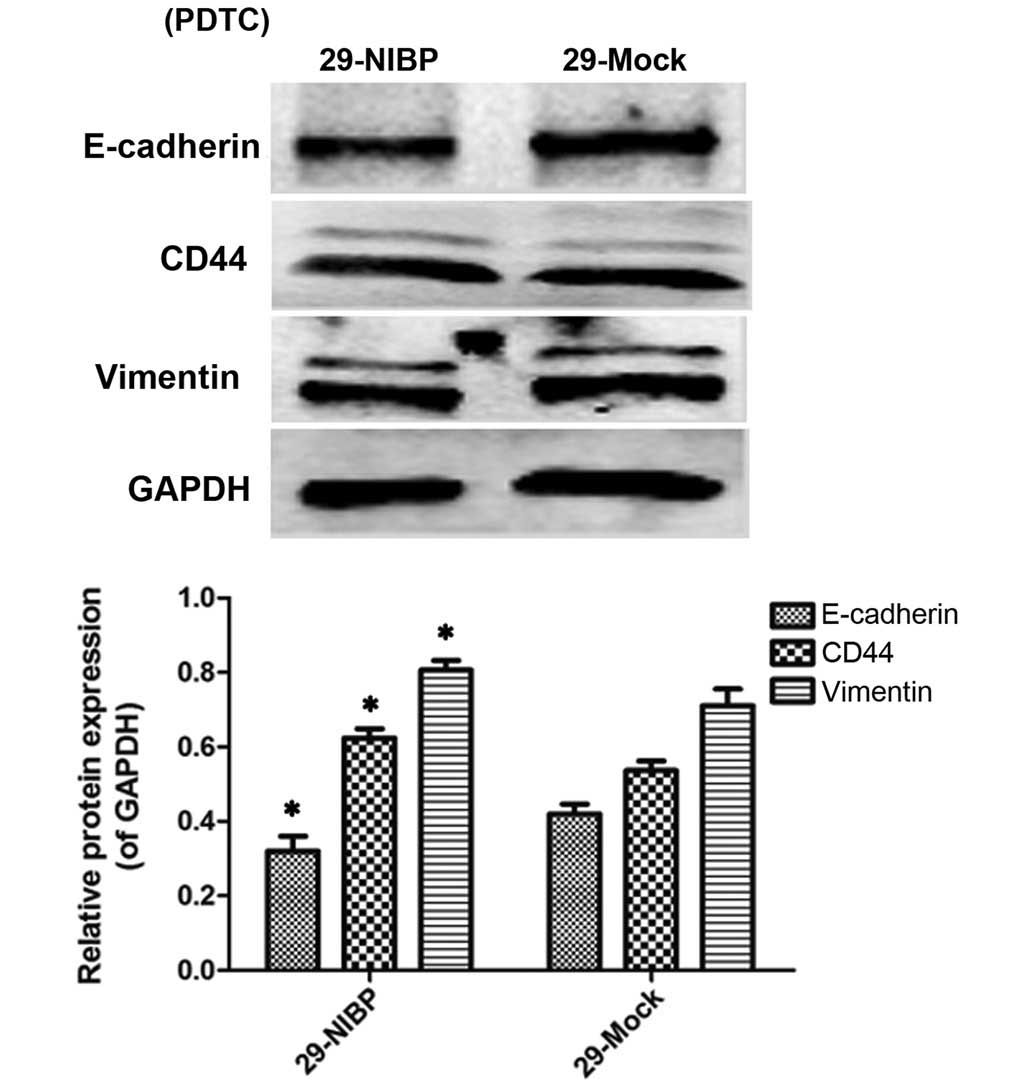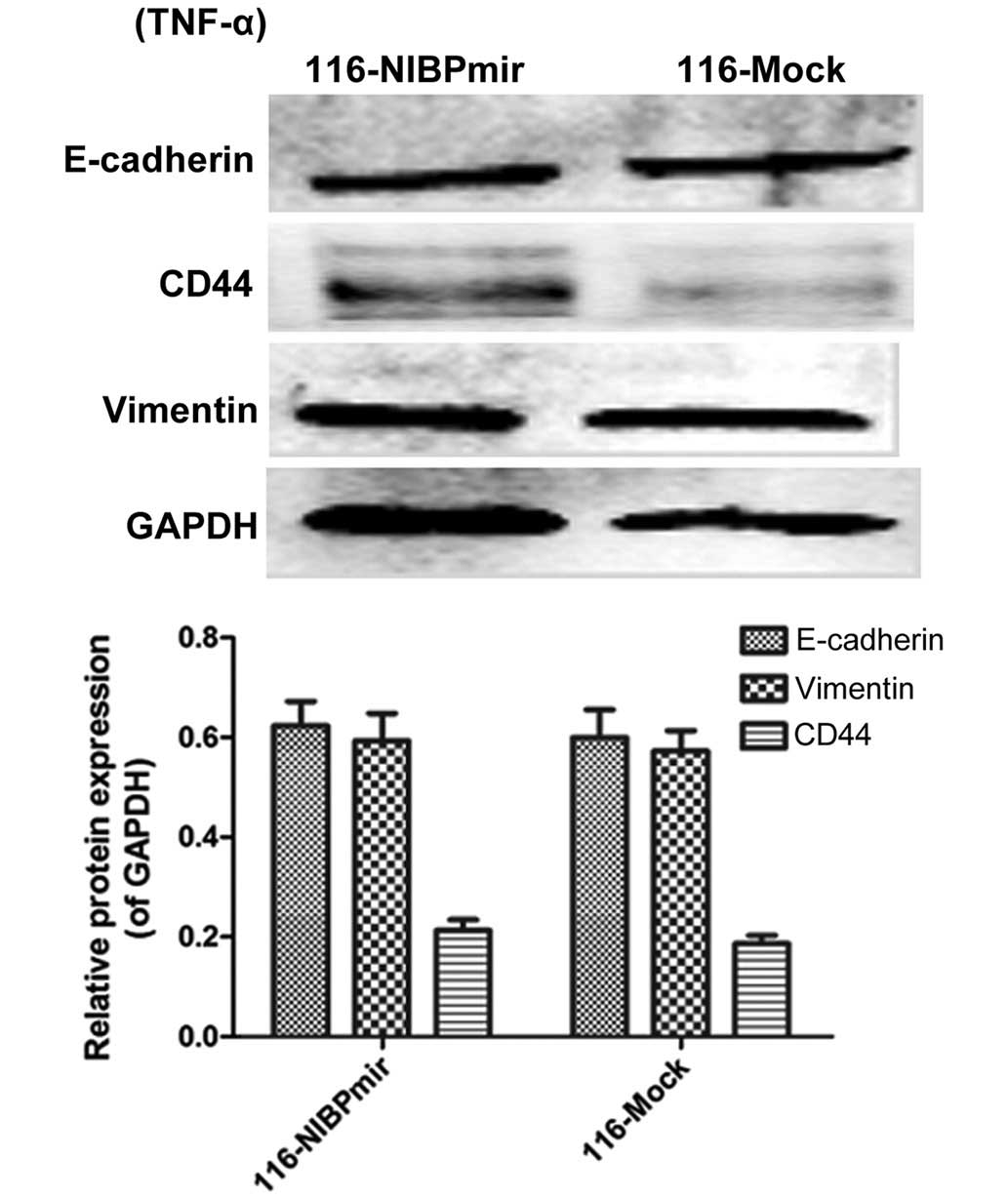|
1
|
Cancer Facts & Figures 2015. American
Cancer Society; 2015
|
|
2
|
Wang F, Yang JL, Yu KK, Xu M, Xu YZ, Chen
L, Lu YM, Fang HS, Wang XY, Hu ZQ, et al: Activation of the NF-κB
pathway as a mechanism of alcohol enhanced progression and
metastasis of human hepatocellular carcinoma. Mol Cancer.
14:102015. View Article : Google Scholar
|
|
3
|
Zhao Z, Wu MS, Zou C, Tang Q, Lu J, Liu D,
Wu Y, Yin J, Xie X, Shen J, et al: Downregulation of MCT1 inhibits
tumor growth, metastasis and enhances chemotherapeutic efficacy in
osteosarcoma through regulation of the NF-κB pathway. Cancer Lett.
342:150–158. 2014. View Article : Google Scholar
|
|
4
|
Zhang LL, Liu J, Lei S, Zhang J, Zhou W
and Yu HG: PTEN inhibits the invasion and metastasis of gastric
cancer via down-regulation of FAK expression. Cell Signal.
26:1011–1020. 2014. View Article : Google Scholar : PubMed/NCBI
|
|
5
|
Perkins ND: Oncogenes, tumor suppressors
and p52 NF-kappaB. Oncogene. 22:7553–7556. 2003. View Article : Google Scholar : PubMed/NCBI
|
|
6
|
Bonizzi G and Karin M: The two NF-kappaB
activation pathways and their role in innate and adaptive immunity.
Trends Immunol. 25:280–288. 2004. View Article : Google Scholar : PubMed/NCBI
|
|
7
|
Patke A, Mecklenbräuker I and Tarakhovsky
A: Survival signaling in resting B cells. Curr Opin Immunol.
16:251–255. 2004. View Article : Google Scholar : PubMed/NCBI
|
|
8
|
Demchenko YN, Glebov OK, Zingone A, Keats
JJ, Bergsagel PL and Kuehl WM: Classical and/or alternative
NF-kappaB pathway activation in multiple myeloma. Blood.
115:3541–3552. 2010. View Article : Google Scholar : PubMed/NCBI
|
|
9
|
Hu WH, Pendergast JS, Mo XM, Brambilla R,
Bracchi-Ricard V, Li F, Walters WM, Blits B, He L, Schaal SM and
Bethea JR: NIBP, a novel NIK and IKK(beta)-binding protein that
enhances NF-(kappa)B activation. J Biol Chem. 280:29233–29241.
2005. View Article : Google Scholar : PubMed/NCBI
|
|
10
|
Zhang Y, Bitner D, Pontes Filho AA, Li F,
Liu S, Wang H, Yang F, Adhikari S, Gordon J, Srinivasan S and Hu W:
Expression and function of NIK- and IKK2-binding protein (NIBP) in
mouse enteric nervous system. Neurogastroenterol Motil. 26:77–97.
2014. View Article : Google Scholar :
|
|
11
|
Qin M and Liu S, Li A, Xu C, Tan L, Huang
J and Liu S: NIK- and IKKbeta-binding protein promotes colon cancer
metastasis by activating the classical NF-kappaB pathway and MMPs.
Tumour Biol. Nov 23–2015.Epub ahead of print.
|
|
12
|
Thiery JP: Epithelial-mesenchymal
transitions in tumour progression. Nat Rev Cancer. 2:442–454. 2002.
View Article : Google Scholar : PubMed/NCBI
|
|
13
|
Thompson EW, Newgreen DF and Tarin D:
Carcinoma invasion and metastasis: A role for
epithelial-mesenchymal transition? Cancer Res. 65:5991–5995;
discussion 5995. 2005. View Article : Google Scholar : PubMed/NCBI
|
|
14
|
Gujral TS, Chan M, Peshkin L, Sorger PK,
Kirschner MW and MacBeath G: A noncanonical Frizzled2 pathway
regulates epithelial-mesenchymal transition and metastasis. Cell.
159:844–856. 2014. View Article : Google Scholar : PubMed/NCBI
|
|
15
|
Tong W, Sun D, Wang Q and Suo J: Sorcin
enhances metastasis and promotes epithelial-to-mesenchymal
transition of colorectal cancer. Cell Biochem Biophys. 2015 Jan
8;Epub ahead of print. View Article : Google Scholar
|
|
16
|
Wang X, Wang H, Li G, Song Y, Wang S, Zhu
F, Guo C, Zhang L and Shi Y: Activated macrophages down-regulate
expression of E-cadherin in hepatocellular carcinoma cells via
NF-kappaB/Slug pathway. Tumour Biol. 35:8893–8901. 2014. View Article : Google Scholar : PubMed/NCBI
|
|
17
|
Cheng ZX, Wang DW, Liu T, Liu WX, Xia WB,
Xu J, Zhang YH, Qu YK, Guo LQ, Ding L, et al: Effects of the HIF-1α
and NF-κB loop on epithelial-mesenchymal transition and
chemoresistance induced by hypoxia in pancreatic cancer cells.
Oncol Rep. 31:1891–1898. 2014.PubMed/NCBI
|
|
18
|
Li SY: NIBP expression in colorectal
cancer tissues and its impact on colon cancer cell proliferation
(unpublished PhD thesis). Guangxi Medical University; 2015
|
|
19
|
Tan L: The research of NIBP protein
expression and its relationship with the transformation of
epithelial-mesenchymal in colorectal cancer tissue (unpublished PhD
thesis). Guangxi Medical University; 2015
|
|
20
|
Zheng L, Fu Y, Zhuang L, Gai R, Ma J, Lou
J, Zhu H, He Q and Yang B: Simultaneous NF-κB inhibition and
E-cadherin upregulation mediate mutually synergistic anticancer
activity of celastrol and SAHA in vitro and in vivo. Int J Cancer.
135:1721–1732. 2014. View Article : Google Scholar : PubMed/NCBI
|
|
21
|
Strippoli R, Benedicto I, Foronda M,
Perez-Lozano ML, Sánchez-Perales S, López-Cabrera M and Del Pozo
MÁ: p38 maintains E-cadherin expression by modulating
TAK1-NF-kappaB during epithelial-to-mesenchymal transition. J Cell
Sci. 123:4321–4331. 2010. View Article : Google Scholar : PubMed/NCBI
|
|
22
|
Zhang J, Yamada O, Kida S, Matsushita Y,
Yamaoka S, Chagan-Yasutan H and Hattori T: Identification of CD44
as a downstream target of noncanonical NF-κB pathway activated by
human T-cell leukemia virus type 1-encoded Tax protein. Virology.
413:244–252. 2011. View Article : Google Scholar : PubMed/NCBI
|
|
23
|
Päll T, Pink A, Kasak L, Turkina M,
Anderson W, Valkna A and Kogerman P: Soluble CD44 interacts with
intermediate filament protein vimentin on endothelial cell surface.
PLoS One. 6:e293052011. View Article : Google Scholar
|
|
24
|
Steinmetz NF, Maurer J, Sheng H, Bensussan
A, Maricic I, Kumar V and Braciak TA: Two domains of vimentin are
expressed on the surface of lymph node, bone and brain metastatic
prostate cancer lines along with the putative stem cell marker
proteins CD44 and CD133. Cancers (Basel). 3:2870–2885. 2011.
View Article : Google Scholar
|
|
25
|
Mashita N, Yamada S, Nakayama G, Tanaka C,
Iwata N, Kanda M, Kobayashi D, Fujii T, Sugimoto H, Koike M, et al:
Epithelial to mesenchymal transition might be induced via CD44
isoform switching in colorectal cancer. J Surg Oncol. 110:745–751.
2014. View Article : Google Scholar : PubMed/NCBI
|
|
26
|
Suzuki Y, Yamaguchi T, Matsumoto H, Nakano
D, Honda G, Shinoura N, Karasawa K and Takahashi K: Prognostic
factors and treatment effects in patients with curatively resected
brain metastasis from colorectal cancer. Dis Colon Rectum.
57:56–63. 2014. View Article : Google Scholar
|
|
27
|
Wein A, Emmert M, Merkel S, Harich HD,
Siebler J, Thiemann R, Lamberti C, Göttler B, Fries S, Kiani A, et
al: Palliative treatment of colorectal cancer with secondary
metastasis resection in Germany-impact of the multidis-ciplinary
treatment approach on prognosis and cost: The Northern Bavaria
IVOPAK I Project. Oncology. 88:103–121. 2015.
|
|
28
|
Chaw SY, Majeed AA, Dalley AJ, Chan A,
Stein S and Farah CS: Epithelial to mesenchymal transition (EMT)
biomarkers-E-cadherin, beta-catenin, APC and Vimentin-in oral
squamous cell carcinogenesis and transformation. Oral Oncol.
48:997–1006. 2012. View Article : Google Scholar : PubMed/NCBI
|
|
29
|
Zhai X, Zhu H, Wang W, Zhang S, Zhang Y
and Mao G: Abnormal expression of EMT-related proteins, S100A4,
vimentin and E-cadherin, is correlated with clinicopathological
features and prognosis in HCC. Med Oncol. 31:9702014. View Article : Google Scholar : PubMed/NCBI
|
|
30
|
Takahashi Y, Sawada G, Kurashige J, Uchi
R, Matsumura T, Ueo H, Takano Y, Akiyoshi S, Eguchi H, Sudo T, et
al: Paired related homoeobox 1, a new EMT inducer, is involved in
metastasis and poor prognosis in colorectal cancer. Br J Cancer.
109:307–311. 2013. View Article : Google Scholar : PubMed/NCBI
|
|
31
|
Rokavec M, Öner MG, Li H, Jackstadt R,
Jiang L, Lodygin D, Kaller M, Horst D, Ziegler PK, Schwitalla S, et
al: IL-6R/STAT3/miR-34a feedback loop promotes EMT-mediated
colorectal cancer invasion and metastasis. J Clin Invest.
124:1853–1867. 2014. View
Article : Google Scholar : PubMed/NCBI
|
|
32
|
Zhang L, Shao L, Creighton CJ, Zhang Y,
Xin L, Ittmann M and Wang J: Function of phosphorylation of NF-kB
p65 ser536 in prostate cancer oncogenesis. Oncotarget. 6:6281–6294.
2015. View Article : Google Scholar : PubMed/NCBI
|
|
33
|
Yu H, Shen Y, Hong J, Xia Q, Zhou F and
Liu X: The contribution of TGF-β in epithelial-mesenchymal
transition (EMT): Down-regulation of E-cadherin via snail.
Neoplasma. 62:1–15. 2015. View Article : Google Scholar
|
|
34
|
Ji Q, Liu X, Han Z, Zhou L, Sui H, Yan L,
Jiang H, Ren J, Cai J and Li Q: Resveratrol suppresses
epithelial-to-mesenchymal transition in colorectal cancer through
TGF-beta1/Smads signaling pathway mediated Snail/E-cadherin
expression. BMC Cancer. 15:972015. View Article : Google Scholar
|
|
35
|
Du L, Rao G, Wang H, Li B, Tian W, Cui J,
He L, Laffin B, Tian X, Hao C, et al: CD44-positive cancer stem
cells expressing cellular prion protein contribute to metastatic
capacity in colorectal cancer. Cancer Res. 73:2682–2694. 2013.
View Article : Google Scholar : PubMed/NCBI
|
|
36
|
Li C, Chen S, Yue P, Deng X, Lonial S,
Khuri FR and Sun SY: Proteasome inhibitor PS-341 (bortezomib)
induces calpain-dependent IkappaB(alpha) degradation. J Biol Chem.
285:16096–16104. 2010. View Article : Google Scholar : PubMed/NCBI
|
|
37
|
Hideshima T, Chauhan D, Kiziltepe T, Ikeda
H, Okawa Y, Podar K, Raje N, Protopopov A, Munshi NC, Richardson
PG, et al: Biologic sequelae of IkappaB kinase (IKK) inhibition in
multiple myeloma: Therapeutic implications. Blood. 113:5228–5236.
2009. View Article : Google Scholar : PubMed/NCBI
|

















